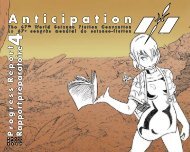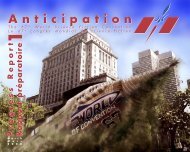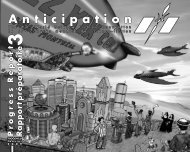Progress
Neil Gaiman - Anticipation
Neil Gaiman - Anticipation
- No tags were found...
You also want an ePaper? Increase the reach of your titles
YUMPU automatically turns print PDFs into web optimized ePapers that Google loves.
Editor GoH: David Hartwell<br />
If you want the essential man, you must imagine him leaning<br />
forward, eyes bright, grinning almost wolfishly as he shares<br />
his enthusiasm for a story, a writer, a musician, a poem. Or<br />
he may equally well be listening. “I have infinite patience for<br />
hearing why somebody’s work is good,” he once said in<br />
my presence, “and none whatsoever for why it isn’t.”<br />
But let me give you some background.<br />
By the nature of the profession, editors work their secret<br />
ministry far from the public eye, and the great bulk of what<br />
they do goes unnoticed and unremarked. So I cannot pretend<br />
to be familiar with more than a fraction of David Hartwell’s<br />
accomplishments.<br />
The little I know, however, is impressive enough. In his time,<br />
David has published and edited magazines of poetry (The Little<br />
Magazine) and criticism (The New York Review of Science<br />
Fiction), and edited a major fiction magazine (Cosmos Science<br />
Fiction and Fantasy Magazine). He’s a small press publisher<br />
of long standing (I cannot resist noting that Dragon Press<br />
published my own Puck Aleshire’s Abecedary) and has been an<br />
essayist, a reviewer, and the author of book-length nonfiction.<br />
Further, David’s thumping big critical anthologies are<br />
magisterial attempts to define modern fantasy, science fiction,<br />
and horror, as well as such sub-genres as space opera and<br />
hard science fiction, by example and explication. (Northern<br />
Stars: The Anthology of Canadian Science Fiction, co-edited<br />
with Glenn Grant, is probably the best single starting place<br />
for anyone who’d like to get a sense of the distinctive nature<br />
of Canadian SF.) He’s a collector, scholar, and part-time<br />
dealer in classic genre fiction. He’s won both the Hugo and<br />
World Fantasy Awards, and edited novels that went on to<br />
win the Nebula or Hugo Award.<br />
Are you out of breath yet? There’s more. David chairs<br />
the board of directors of the World Fantasy Convention and<br />
is co-administrator of the Philip K. Dick Award. He’s been<br />
an editor for Signet, Berkley/Putnam, Gregg Press, Pocket<br />
Books/Simon & Schuster (where he created Timescape<br />
Books, one of the best lines of genre fiction ever published),<br />
Arbor House, William Morrow, and is now a senior editor<br />
at Tor Books. With his wife, Kathryn Cramer, he edits both<br />
science fiction and fantasy best-of-year anthologies. He has a<br />
huckster table at most of the conventions he attends.<br />
He has, in short, filled every ecological niche in the<br />
publishing universe save one – that of a fiction writer.<br />
This last is unusual and may be unique. Almost all editors<br />
begin as writers, whether successfully or not – and almost all<br />
writers begin by reading a bad work of fiction and thinking, “I<br />
could write better than this!” David Hartwell’s moment on the<br />
road to Damascus came when he read a bad science fiction<br />
novel and thought, “I could show the writer how to fix this!”<br />
He’s been on that road ever since.<br />
David has been my friend for the entirety of my<br />
professional career, and in that time he’s been unfailingly<br />
warm and open-hearted. He’s a bit of a raconteur, something<br />
of an amateur historian of the field, and possessed of a<br />
puckish sense of humor. He has a Ph.D. in Comparative<br />
Medieval Literature and the most extraordinary fashion sense<br />
in the known universe. He is a tireless promoter of the good.<br />
And, to this end, he has an agenda.<br />
That agenda, if I read him correctly, goes something as<br />
follows: Science fiction is best understood as itself. It has<br />
virtues that are not achievable in mainstream fiction, and trying<br />
to shoehorn SF into the mainstream or even to judge it by<br />
mainstream standards only dilutes those virtues. This, however,<br />
makes it in no way inferior to other forms of literature – merely<br />
different. It is to be celebrated, admired, and cherished.<br />
As is David Hartwell.<br />
I’ve had many a conversation with David and I can always<br />
tell if I’m holding up my end of one. He leans forward. His eyes<br />
brighten. He smiles almost – but not quite – wolfishly. For a writer,<br />
that’s as close to being the embodiment of one’s ideal audience<br />
as is ever going to be met in the flesh. Which is, I suppose, one<br />
definition of what an editor is. – Michael Swanwick<br />
8 Anticipation – Rapport préparatoire 4







